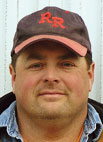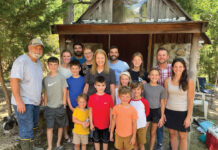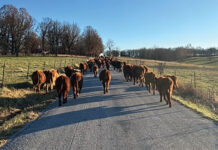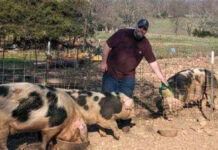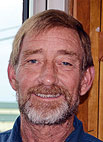
Paul Crabtree does chores much like many other cattle producers in Southwest Missouri, he also farms, like many other producers, and he is very active in his community. Though many other farmers and ranchers do similar things, Paul does it all on a farm that has been in his family for 115 years.
Paul and his family farm about 1,000 acres of row crops, half of which are irrigated from reservoirs, cares for close to 150 cows plus calves and bulls, and bales all his own hay. Every year he custom bales nearly 1,000 acres of prairie hay, so he has plenty leftover to sell. However, he still manages to find time to work energetically both for the community and for farmers as a whole.
He has served on the Barton County Extension Council for many years and is set to begin a term as Vice Chairman this year. He is active with the Tri-State Water Resource Coalition and the Missouri Irrigators Association, and he was also a member of the 13th Agriculture Leaders of Tomorrow (ALOT) class.
He learned about the ALOT program from Don Lucietta, who is on the organization’s board, and Paul thought that it would be a valuable use of his time, so he applied.
Those who are chosen to be part of an ALOT class spend 2 years attending meetings and workshops around the state, the nation, and the world. There are 2 day sessions scheduled in each part of Missouri so all participants can get a firsthand feel for what farmers and ranchers go through around the state. They also spend time in Jefferson City, Mo. and take an entire week in Washington D.C. The class climaxes with a trip to a foreign country. Paul’s class went to Europe and spent most of 2 weeks in France, Belgium and England.
Though the primary goals of ALOT are professional development and to promote leadership, participants learn about more than just agriculture. They also learn about the governmental policies around the state and around the world. The organizers of ALOT believe that it is important to understand how policies are made in order to better know how to affect them.
By learning about the similarities and differences between producers around Missouri and the connection they have with farmers and ranchers on other continents, ALOT participants are able to share their stories and opinions and find familiarities. They realize the importance of using the common ground they find to work for what is best for everyone.
Paul found that the farmers in Belgium were a lot like farmers in America. He was impressed by the way some of the Belgian farmers were able to communicate despite the language barrier and how much they resembled average American farmers. He also found that politics are politics, whether he was visiting the European Union headquarters, Washington D.C., or Jefferson City.
Back at Paul’s family farm near Liberal, Mo., the chores still need done, regardless of politics. The ALOT organizers gave the class breaks for planting and harvest season so that producers like Paul could do their jobs. The Crabtree cattle herd is mostly crossbred. His father, Sam, has always favored Herefords, but his grandfather had Polled Herefords, then Limousins, which then he crossed with Gelbviehs. Now, the Crabtree herd is mostly white faced cattle. They have started using some black animals to get the “black baldy” look.
Paul and Sam are currently trying to build the herd to maximize full use of their pasture, so they are keeping most of the heifers. When they sell animals, they do most of their marketing at the local stockyards.
Paul is optimistic about the direction the cattle market is headed and remains positive about agriculture’s future.
That is why he works so hard with his cattle and his crops, and for his family and his community. The ALOT program taught him about leadership, and his example is worth following.

